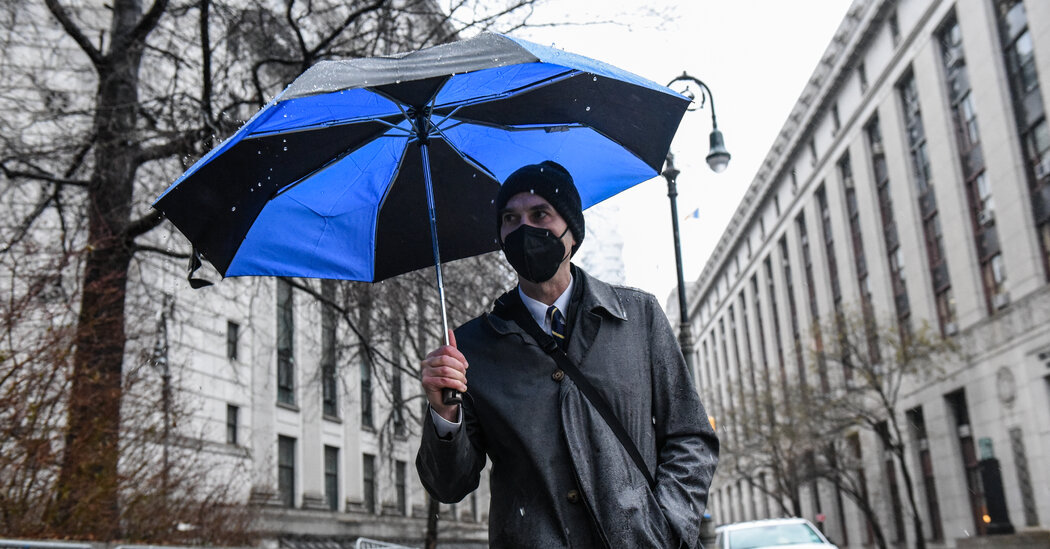The editor who oversaw publication of the 2017 editorial at the heart of Sarah Palin’s libel suit against The New York Times said on Tuesday that he ultimately bore responsibility for its errors, capping his first day of testimony in the trial that will determine whether The Times is held liable for defamation in the United States for the first time in at least 50 years.
“This is my fault. And I’m not looking to shift blame to anyone else,” James Bennet, the former editorial page editor for The Times, said under questioning from one of Ms. Palin’s lawyers.
The former Alaska governor’s legal team tried for most of the day to convince the jury that Mr. Bennet and other Times journalists acted hastily and recklessly in publishing the editorial, which falsely linked Ms. Palin’s political rhetoric to a mass shooting. They are also trying to establish that The Times was slow in appending a correction, which did not name her or offer an apology to Ms. Palin.
They focused on emails between Mr. Bennet and other members of the Times opinion staff to establish a timeline between the publication of the editorial on the night of June 14, 2017, and the addition of the correction the next morning.
Mr. Bennet, who was contrite at times and unexpressive at others during two and a half hours of testimony, explained that he went home on the evening the paper appended a two-part correction to the editorial thinking that he had apologized to Ms. Palin. Now aware that she did not take the correction that way — her lawyers have repeatedly mentioned that it did not include her name — Mr. Bennet added, “I would hope that as a consequence of this process now I have.”
As he spoke, Ms. Palin sat just a few feet away in the federal courtroom in Lower Manhattan.
The editorial, which lamented the nation’s increasingly heated political discourse, was written after the shooting at a congressional baseball team practice in June 2017 that left Representative Steve Scalise, Republican of Louisiana, gravely wounded. As Mr. Bennet was editing the piece before publication, he inserted an incorrect reference to a 2010 map from Ms. Palin’s political action committee that included illustrations of cross hairs over 20 House districts held by Democrats.
That addition — “the link to political incitement was clear” — asserted that there was a link between the map and the 2011 shooting that critically injured another member of Congress, Gabrielle Giffords, and killed six others in Tucson, Ariz. In fact, such a link was never established.
Most defamation cases against news organizations never make it to a trial, because they are either dismissed or settled. Among other considerations, settlement spares media companies from the messy and often unflattering process of having their internal communications put on public display.
Over four days of testimony so far, the inner workings of The Times’s writing and editing process have been reviewed with an exhaustive level of detail.
Ms. Palin’s lawyers have shown the jury emails, drafts of the editorial and other documents meant to shed light on the motivations of Times journalists as they deliberated how to write the piece — and in particular the two sentences that caused Ms. Palin to sue.
Shane Vogt, one of Ms. Palin’s lawyers, pressed Mr. Bennet at one point on why he did not do more that night to investigate whether he had in fact made an error once readers began complaining about it online.
Ms. Palin’s lawyers also showed the jury an email, sent at 10:35 p.m., in which a Times columnist, Ross Douthat, expressed his “bafflement” at the editorial’s link between Ms. Palin, a Republican, and the Giffords shooting when the news of the day involved the targeting of Republican members of Congress by someone who had written disparaging posts on social media about President Donald J. Trump. Mr. Douthat complained that “our editorial seems to essentially reverse the fact pattern, as I understand it.”
Mr. Bennet insisted that he had not taken the issue lightly and had reached out to the writer of the editorial with a text message around 11 p.m.
“I didn’t wait,” he said.
Mr. Vogt responded, “Did you call her?” Mr. Bennet replied, “I didn’t call her.”
Mr. Bennet will be the highest-level Times journalist to be grilled by Ms. Palin’s lawyers. Her lawyers are trying to convince the jury that he and The Times acted with reckless disregard for the truth, the high bar that the Supreme Court has set for public figures like Ms. Palin to win a defamation suit.
Mr. Bennet will resume his testimony on Wednesday. And when he is finished being cross-examined by lawyers defending The Times, Ms. Palin is expected to take the stand.


























